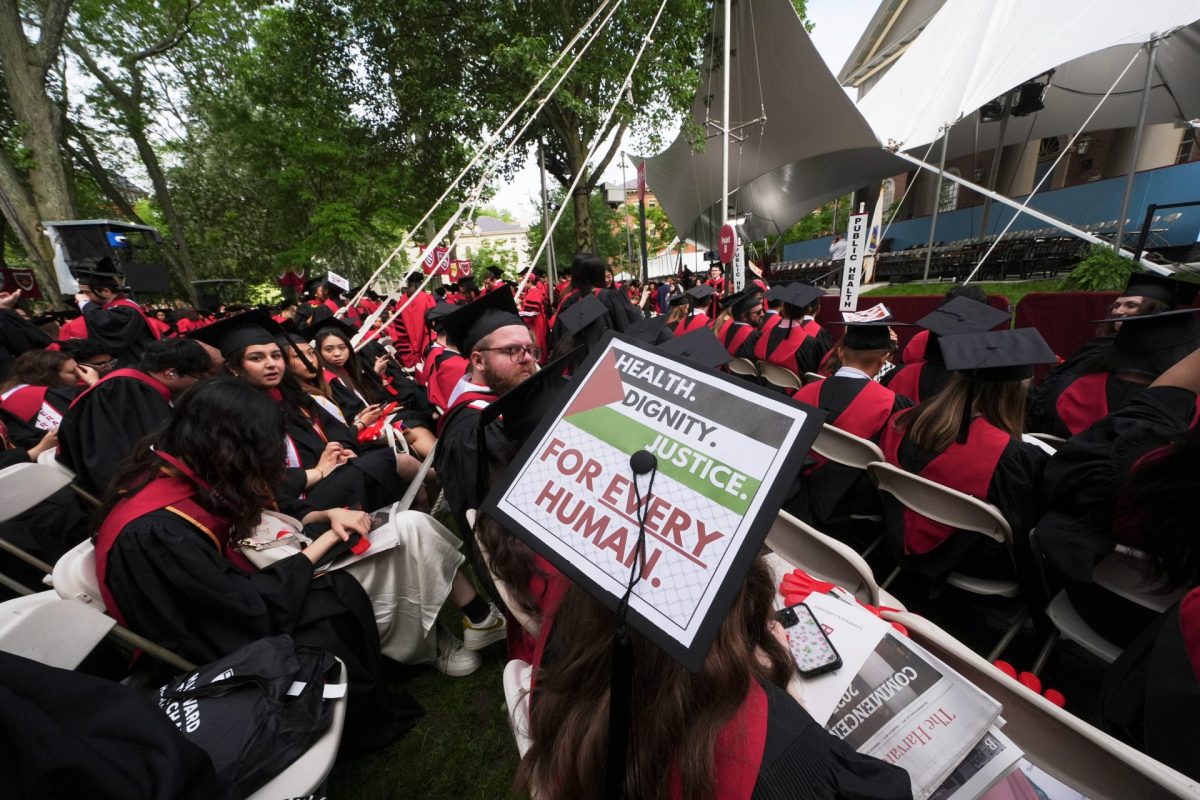
AP Photo by Charles Krupa
Graduating students attend commencement ceremonies at Harvard University, Thursday, May 29, 2025 in Cambridge, Mass.
President Donald Trump has launched consistent attacks on Harvard University since his inauguration in January. The Trump administration continues to threaten withdrawing federal dollars from the university, alleging antisemitism issues and DEI practices that the president is notoriously against.
In the latest threat, Trump, alongside the Department of Homeland Security (DHS), has ordered the cancellation of Harvard’s Student and Exchange Visitor Program (SEVP) certification, meaning that the university can no longer enroll foreign students.
A.D., who chose to remain anonymous for safety reasons, is an international DePaul graduate student from India who is studying writing and publishing. She chose to study abroad because she believes the United States respects the talents and creativity of individuals. A.D. said Trump’s actions against Harvard are “deeply disappointing.”
“Institutions like Harvard have always stood as beacons of diversity, innovation and global collaboration,” she said. “Barring international students undermines those very ideals.”
Trump also asked Harvard to disclose a list of “names and countries” of the international students enrolled, which DHS claims the university refused to do. DHS says this refusal was part of the reason their SEVP certification was revoked.
Following this news, grant termination notices were sent to Harvard from the federal government including departments like the National Institutes of Health and the National Science Foundation.
Harvard is suing the Trump administration for funding cuts, with a case set in July. Following the most recent news about international students, Harvard launched an additional lawsuit for barring international students.
U.S. district Judge Allison Dale Burroughs temporarily blocked the order prohibiting international student enrollment.
Trump has consistently been building a case against Harvard since his inauguration. He has reiterated his belief that Harvard should lose tax-exempt status, and the university has seen the freeze of their more than $2.2 billion in grant money following Harvard’s refusal to comply with Trump’s initial demands of shuttering DEI programs.
For Trump, the plan to retract federal dollars from higher education institutions has been a goal throughout this administration.
“We’re going to bankrupt these universities. We’re going to take every single federal dollar,” Trump said in a Fox News interview in March.
DePaul political science professor and chair Scott Hibbard is “horrified, just horrified” of Trump’s attacks on Harvard.
“This is an assault on not just Harvard, but on higher ed,” Hibbard said. “What this is really all about is an effort to use the threat of withholding money to get these institutions to change their world views.”
On May 28, Trump suggested Harvard implement a 15% quota for international student enrollment. According to Harvard’s student enrollment website, 27.2% of the student body is made up of international students.
A.D. said the quota suggestion feels “regressive” in a world that is becoming increasingly interconnected.
“Education thrives on the clash and blend of global perspectives,” A.D. said. “Why limit voices when we should be inviting more in?”
Another issue with blocking international student enrollment is the financial toll it will then have on American students to attend college, according to Hibbard.
“Foreign students frequently pay full tuition, and that helps subsidize other people’s tuition,” Hibbard said. “So if you eliminate that financial resource, well now those Americans are going to pay more for their education.”
A.D. is also worried about her student visa status and said every policy shift feels like a threat.
“The uncertainty weighs on your mind constantly — will I be allowed to finish my degree? Will a change in policy undo years of effort? It’s like building a life on unstable ground,” A.D. said.
As universities throughout the country continue to fear attacks from the president and for their own federal funding, DePaul and International Student and Scholar Services continue to monitor immigration guidance.
“At DePaul we welcome and support all students. International students are an integral part of our diverse DePaul community,” said GianMario Besana, associate provost for global engagement, and Gretchen Frickx, senior director of international student success and global partnership management, in a statement to The DePaulia. “We understand the toll that this uncertainty can have on members of our community. We encourage students to reach out if they’re in need of support.”
As lawsuits continue against the administration, many are questioning the legality of the Trump administration’s moves to cut federal funding.
“A lot of stuff that the administration is doing is not legal, and that’s why they’re being taken to court,” Hibbard said.
DePaul has also continued to advocate for international students, according to the statement from University Communications. They partner with associations such as the Institute for International Education and the Presidents’ Alliance on Higher Education and Immigration, among others.
Faculty have shown similar support for international students.
“There are things we should be doing as a university,” Hibbard said. “One is protecting our people.”
Hibbard’s goal as an educator amid attacks on DEI and higher education alleging “progressive indoctrination” is to “teach people to think critically and look at things from multiple perspectives” — which is something Hibbard won’t abandon.
As the conflict between Trump and universities unfolds, A.D. said it feels like the Trump administration is sending a message that international students are welcome, but only conditionally.
“International students don’t just study here — we contribute,” A.D. said. “We bring a piece of our homeland and add it to the cultural mosaic of this country. Reducing our presence doesn’t protect American education — it impoverishes it.”
Related Stories:
If a constitutional crisis happens, what can be done?
Could DePaul be next? Federal aid fight puts students at risk
Tariffs have disrupted the global economy: Here’s what’s changed since Trump’s ‘Liberation Day’